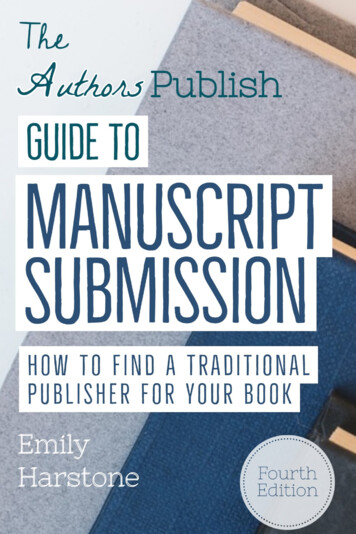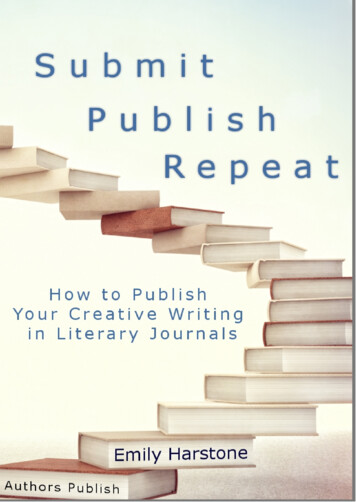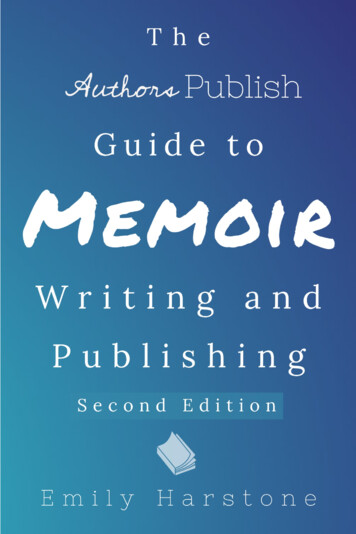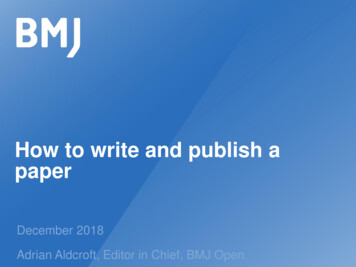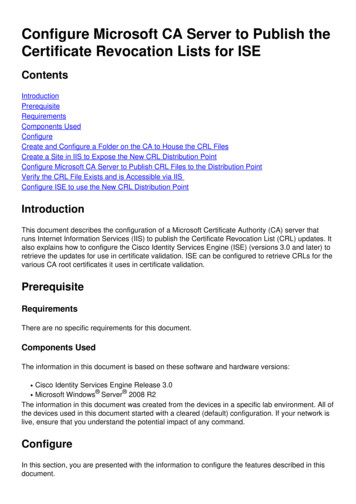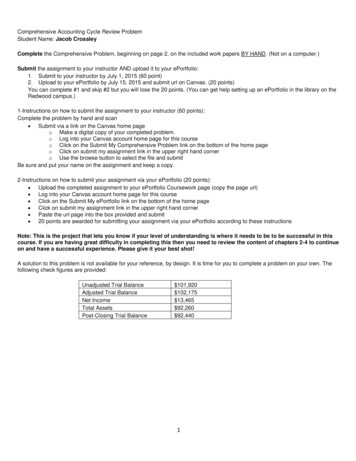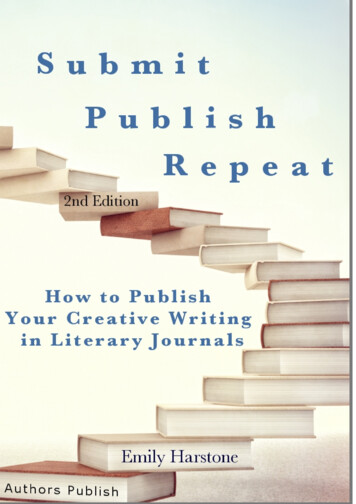
Transcription
SubmitPublishRepeatHow to Publish Your Creatve Writngin Literary Journals2nd EditonEmily HarstoneAuthors Publish
Copyright 2015 Authors Publish. All rights reserved.Do not distribute this book without written permissionfrom the publisher.Contact: support@authorspublish.com
Introduction.Chapter 1: Why You Should Submit to LiteraryJournals.Chapter 2: How to Know Your Work is Ready to Submit.Chapter 3: The Basics of Submitting.Chapter 4: Five Tips for Submitting Your Work.10Chapter 5: How to Prepare Your Work for Submitting. 12Chapter 6: How to Submit Your Poetry for Publication. 13Chapter 7: Print Versus Online Journals.14Chapter 8: How to Choose Where to Submit Your Work. 15
Chapter 9: Beginner Mistakes You Can Avoid Making. 16Chapter 10: 10 Literary Journals that Pay TheirWriters. 16Chapter 11: How to Find Literary Journals.18Chapter 12: Paying to Submit.20Chapter 13: Are Contests Worth The Fee?.21Chapter 14: Your Publishing Journey.22
IntroductonIn my experience, one of the best ways to become anestablished author is not by sending out a thousandquery letters to agents and independent publishers.Instead, all of my professors in graduate school,famous authors, and poets became established thesame way: by publishing their work in literaryjournals.A literary journal is a magazine that specializes inpublishing work of literary merit. Some focus on aparticular genre, like science fiction or crimewriting, and others just publish poetry, shortstories, or flash fiction. Most are open to work of allkinds. There are well over four thousand literaryjournals that are being published at this time. Someare printed publications that have 1-12 issues ayear, others are electronic publications. Manyliterary journals have both print electronic versions.
AuthorsPublishSubmit, Publish, Repeat7Literary journals are published all around theworld. There are respected journals published inEnglish and based out of China, Spain, Germany, andalmost any other country you can think of. Mostjournals are open to work by authors of anynationality.Many literary journals are associated with anacademic institution; most universities have at leastone literary journal they produce. Most of thesejournals are well-respected. Another quick way tospot a respected journal is to see when it started.Some journals have been around for well over ahundred years.The majority of literary journals do not pay theirwriters. This is because many are registered as nonprofits. It is also because most online sites thatpublish literary journals have no ads, and thus noobvious way to raise money. Some journals do pay,usually between 10 and 75 for poems and shortstories. In addition, most print magazines give you a
complimentary copy of the journal your workappears in.In this book I will talk about why you should submitto literary journals. I will also provide advice onhow to find reputable journals, how to submit tothem, and all the other practical details involved insubmitting.I have had my work published in over 50 reputablejournals, as well as in many anthologies, some ofwhich you can find at most major bookstores. Mypoetry has been translated and published in over 10countries. I have also submitted for othersprofessionally. I have placed many poems inprestigious journals for other people. I have done allthis in the last four years, and before that point Ihad never submitted to a literary journal.This publication history helped me find publishersfor both my chapbooks. The first university I washired to teach at chose to employ me based on mypublication record, as at that point I had no
AuthorsPublishSubmit, Publish, Repeat9experience teaching at the university level. I alsoknow that publishers will consider my manuscriptmore seriously, because many of the poems mymanuscript contains have been previouslypublished in established literary journals.Submitting and being published by literary journalshas helped improve my writing life in so many ways.That is one of the reasons I always encourage othersto get their work out there.
Chapter 1: Why You Should Submit toLiterary JournalsWhen I was first starting out as a writer, I had nodesire to submit to literary journals. I did not reallyunderstand what function they served, and I alsodidn't know how many there were out there; I justthought they were a small niche marketplace.By the time I entered graduate school I had beenpublished a few times. Most were in journals whereI knew the editor and my work was solicited. Thissounds nice and easy, but it is actually lessrewarding if you know the person in charge of apublication. You always wonder if they chose yourwork just because they know you.When I entered graduate school I discovered veryquickly why having your work published in literaryjournals was important, regardless of what genreyou wrote. It was a stamp of approval, a way of
AuthorsPublishSubmit, Publish, Repeat11making it clear that you were not a novice. It alsomade it easier to publish work in the future.The first reason that you should start submitting tojournals is that agents and publishers are morelikely to sign a contract with an author who has atrack record. I had written many query lettersbefore I started submitting to journals, and myauthor’s bio was always depressingly empty.Once I started to publish my work in literaryjournals, I started to get the attention of agents andpublishers in a way I hadn't before.Novice writers often complain to me about theexpectations agents and publishers have for preexisting publications. They tell me about howcomplicated it makes getting the first bookpublished. If they started to submit short storiesand excerpts of their novels to journals forpublication, they would have a solid stepping-stonetowards getting their first book published.
The second reason you should submit to journals isthat it can actually attract agents to you, or create adirect connection with a publisher. I know severalauthors who have received queries from agentsafter getting their piece published in a prestigiousjournal.If the journal is well-respected it can even lead theagent or the publisher to you. In addition, somejournals, like Tin House and Rust Moth, have amanuscript press attached to the journal. Thesemanuscript presses almost always end uppublishing authors whose work has appeared intheir journals first.The third reason that you should submit to journalsis, as a general rule, the more you are published theeasier it is to get more work published. Now when Isubmit my work to a respected journal I am nolonger a poet without publications, but one who hasappeared in many prestigious journals. I don't knowif that alters the editor’s opinion, but it probably
AuthorsPublishSubmit, Publish, Repeat13encourages them to examine my work more closely.My work certainly receives more acceptances andappears in more prestigious journals every year.
Chapter 2: How to Know Your Work isReady to SubmitMost writers struggle with this question the most. Theywrite something and then for a brief moment they feel itis the best thing ever written, then they change theirmind. Even after many edits they are not always sure ifsomething is ready. Perhaps you do not do this. If youare someone who is always sure that your work is readyfor public consumption, you can skip this chapter.I am someone who is prone to self doubt and rarely do Ifeel like a piece is ever truly done, however I have a setof guidelines that help me know when I am ready to submit it. Having these guidelines in place helps me alwayshave something to submit.Make Sure the Piece Is at Least Two Weeks Old
AuthorsPublishSubmit, Publish, Repeat15When I frst write a poem or short piece of prose I tendnot to have any idea if it is any good or not. I lack perspective on it. I like to take at least two weeks off beforeediting it. I think space and time really helps.Get Another Persons PerspectiveThis step is not always possible for me anymore, I writeand submit so often that it is hard to fnd someone togive me detailed feedback for all my poems, but at leastfor the frst few times you submit it is very important tohave someone look over the work.If you are just looking for typos anyone will do, howeverif you want more feedback than that, and honestly youshould probably have it, look for someone whose opinion you trust, or look for a writing group. Many independent bookstores and libraries house writing groups. Writing Groups are wonderful because you get feedbackfrom a variety of people all at one time.
Know Your SelfMost people make the same minor grammatical or spelling errors over and over again. Most writers also tend tooveruse a favorite word or phrase.If you know what mistakes you tend to make in terms ofspelling and grammar you can be on guard for these. Forexample I have a tendency to add more commas thanneeded.In terms of words, I sometimes use the word ‘lull’ too often. If you know these sort of things about your ownwriting you can avoid falling into any obvious traps.Avoid Beginner MistakesBeginning prose writers don’t usually pay enough attention to paragraph breaks.
AuthorsPublishSubmit, Publish, Repeat17Poets who have yet to be published tend to fall into apunctuation trap. They tend to use punctuation sporadically. It is best to use consistent punctuation when submitting a piece. Journals are more open to publishingwork with established, predictable punctuation.EditMake sure that everything you submit to journals isedited. This may seem obvious but unfortunately it isnot. Some people submit their frst drafts to literary journals. This usually ends in rejection, but if the piece is accepted with mistakes and the mistakes are published thisrefects poorly on the author. Make sure to edit both formistakes and for contentDon’t ProcrastinateSometimes it is hard to take that fnal step and submit,even if you have edited a piece a half dozen times ormore. Don’t fall in to that trap, even if you are a perfectionist. Start submitting after you have completed theabove steps and are satisfed with your work. Even if it isnot perfect in your own eyes, it could very well be for
someone else. After all, writers are often their own worstcritic.
AuthorsPublishSubmit, Publish, Repeat19Chapter 3: The Basics of SubmitngIt is very easy to submit your work to literary journals.In the past you had to submit work through the mailwith a self addressed stamped envelope (SASE) and itcould take months or even years to hear back from thejournal. Submitting through the mail still exists butonly around 10% of literary journals require you to doso.Now the world is very different. Turn-aroundtimes are much faster. Trees are being saved. Someliterary journals still require post submissions, but mostaccept electronic submissions.There are two primary ways to submitelectronically. The frst is through email. That wayused to be the most common way to submit. You canuse your existing email address or create an accountthat you use exclusively for submitting. People havepersonal preferences. It is good to fgure out whichworks better for you.
When you submit via email, some journalsprefer the work to be attached and others prefer thework to be in the body of the email. Either way it iseasy to submit via email, and rather fast.However, the second method of electronicsubmitting is becoming even more popular.Submission managers, largely run by third partyservices, are becoming even more common.Submission managers are easy to use sites thatorganize the information for the editors on the otherside.By far the most popular submission manageris Submittable (formerly submishmash).Submittable charges the journals that use it, but notthe submitting writers. It is easy and free to set upan account. You can even connect it to a preexisting Facebook account.Submittable saves your address and contactinformation, and makes it easy to insert your coverletter and upload your work. It also allows for easywithdrawals of work from some journals if yourpiece is accepted elsewhere.
AuthorsPublishSubmit, Publish, Repeat21There are other smaller submissionmanagers, but most you have to sign up for on anindividual basis.Once you have done that, all you have to do isupdate your submission tracker (more on that in thenext chapter). Submitting is very easy and once youhave submitted a few times and know how to fnd goodjournals it can be easy to submit to up to seven journalsin one hour.
Chapter 4: Five Tips for SubmitngYour WorkIf you have never sent your creative writing out to aliterary journal before, the experience can beintimidating. Many productive writers try to avoidsubmitting; however there is no real way around itif you want to get your work out into the world.This chapter contains five tips for submitting yourwork. Even if you have previously sent out workbefore you may still find them helpful. I have beensubmitting for four years now. After submitting forso long, these tips are still a touchstone for me. Theyalways help me keep on track.My first tip is to set a submission goal for yourself.Set it somewhere that seems reasonable to you:perhaps five submissions to different magazines permonth. I often exceed my per month goal, becauseonce I reach that point, I want the feeling of
AuthorsPublishSubmit, Publish, Repeat23accomplishment to linger. Soon those submissionswill really start to add up. The more experience youhave submitting, the faster you get; as you progressit becomes easier to submit your work. I often have40 submissions out at a time. Three of the mostrespected authors I know suggested that this wasone of the ways that they became successful. I don’tknow why 40 is the magic number, but it seems tobe the case.My second tip is to create submission packets. If youare a short story writer you don't need to do this,since most journals only consider one short story ata time. However if you are a poet or a flash fictionwriter, journals generally want between 3-5 of yourpoems or flash fiction stories to consider at a time. Ihave 5 packets that each contain between 4-5poems. I always reserve two packets to submit toplaces that do not accept simultaneous submissions.The rest I submit to multiple places.
My third tip is to keep track of what you submit andwhere you submit it to. I keep a Word documentthat keeps track of which journals I have submittedto, what poems I have submitted to them, and whenI submitted these poems. I write down which poemshave been accepted and where. I document whichjournals have rejected certain poems. I update this'submission tracker' every time I submit, otherwiseI might submit the same poems to the same journaltwice, or submit poems that have been acceptedelsewhere, or any similar minor disasters. Makesure you regularly update this document; otherwiseit will get out of control. I have included a sample ofa very small submission tracker:Sample Submission Tracker:Pending:The New Yorker, Submitted September 28th. What TheLiving Want (short story)Perception, Submitted September 28th, My Teeth,Supermax, Pumpkin Bread (poems)
AuthorsPublishSubmit, Publish, Repeat25Acceptances:Waterhouse, Submitted Jan 14th, 2013. Ham,Companion, Ursa Minor (poems).Accepted Companions:Block Review, Submitted Jan 25th 2013, Ready (shortstory).Rejections:Three penny Review, Submitted Jan 7, 2012. Reel(short story).Apple Journal, submitted Jan, 7, 2013. Hopscotch(short story)My fourth tip is to create a couple of biographicalstatements. When you read submission guidelines,which vary from site to site, almost all of them willrequire that you include a brief biographicalstatement and a cover letter. Most submissionguidelines are very similar, so as long as you have abiographical statement and a cover letter on astandby it should take you very little time to submit.
One of your biographical statements should beunder 50 words and the other should be under 100words in length. Once your work has beenpublished in various literary journals you shouldinclude some of the most recent or prestigiousjournals in your biographical statement. However,you should not include all of them, that would justbe overwhelming and it would come off asunprofessional. Below are examples of biographicalstatements of less than 50 words, one containsjournal names, one does not.Sample Bio 1:Maria Smith resides in the rural PacificNorthwest. Her work has appeared or isforthcoming in numerous places, including:Tin House, The Liner, and Echolocation, andthe anthology Killer Verse. Her secondchapbook Pancakes for Dinner isforthcoming in 2014 from Hawthorne Press.Sample Bio 2:
AuthorsPublishSubmit, Publish, Repeat27Joshua Jones is a poet, editor, and recoveringNew Yorker who now lives in Idaho. Joshuaonce wrote a sonnet every hour for twentyfour hours straight. He loves to hike, cook,and read.My fifth tip is to create a standard cover letter for allthe journals that you are submitting to. A cover lettershould be as simple as possible; an editor does nothave a lot of time and does not want to be boggeddown by the details. If I am submitting to a journal Iparticularly like, I will include a note about why I likeit. Sometimes journals will request that I includeadditional information such as titles and word count inmy cover letter and I will cut and paste thatinformation in. Otherwise my cover letter is almostidentical to the sample letter.Sample Cover Letter:Dear Editors,The following poems are for yourconsideration.
Thank you for your time,Katharine Hathaway
AuthorsPublishSubmit, Publish, Repeat29Chapter 5: How to Prepare Your Workfor SubmitngOne of the questions I am most frequently asked ishow do you choose what to submit? Now there is nosimple answer to this but there are a couple of goodsteps to take.For one thing I never ever submit a piece that I justwrote. When you first write something, you lackperspective on it. You have that new love glow. Overtime this glow fades and you can see the piece froma more objective perspective. I wait at least a monthbefore submitting anything.Not everything one writes is worth submitting. Youshould not try to get something published just forthe sake of publication. You should be proud of thepiece and want to share it.
In addition to giving myself time in order to havesome perspective, I much prefer to have someoneelse look at the piece before I submit it. This doesnot always happen, but often I am able to get afriend, a family member, or a member of my writinggroup to give me their perspective on the piece.Sometimes all they do is catch typos, but often theyare able to point out the redundant words that havemade their way into the piece. They can also pointout what I left out. As writers, we’re often too closeto our work to know what might be missing. It allmakes sense to us, even if it doesn’t actually makesense. That’s why it is important to get feedbackbefore you submit.No matter what, I make sure that I edit the piece asthoroughly as possible for typos, misspellings andgrammatical errors. No matter how hard I workthese sometimes sneak in. A simple mistake canprevent your piece from being accepted. If you arenervous about that aspect of submitting, it might be
AuthorsPublishSubmit, Publish, Repeat31worth hiring someone to look over your work. Copyeditors can be relatively cheap and easy to find onthe web. You can try websites such as Fiverr.I also try to make sure that I have the right title. Inever thought about titles much until I was aneditor of a literary journal when I realized that theywere the first impression an editor has of the poem.Plus, during editorial board discussions, your poemis almost exclusively referred to by its title.It is good to choose a title that is memorable,particularly when it comes to short stories orcreative non-fiction. Try to choose a title that mostother people would not have thought of, yet onethat fits with your piece. When I was working as aneditor, we received multiple pieces from differentauthors with the same title. None of these piecesmade the final round.Also, make sure the first line or first paragraph areparticularly appealing,. If the title is your firstimpression, the first line or paragraph is your
second. It is important to attract a reader’s attentionright away. Often, when writing, the first paragraphis the writer’s on ramp, their way into the story orpoem, however the essential information is notusually contained in the on ramp. Make sure thatyou have a good first line, even If it requires anumber of revisions.
AuthorsPublishSubmit, Publish, Repeat33Chapter 6: How to Submit Your Poetryfor PublicatonIf you’re ready to get your poetry published inliterary journals, then you’re going to need to gothrough the process of submitting your work. Thisportion will guide you through the most importantstep in the process so that you can start submittingyour work, and get published.What is that step? Putting together your submissionso that it has the best chance of getting the editor’sattention, and being accepted for publication.When you submit short stories or non-fiction to ajournal it can be very straightforward: You justchoose one well edited story that you wrote andsubmit it.With poetry, things are a little tougher because youhave to choose 3-5 poems to submit. There are
several things you have to do before you submitthem.The first step is that you have to choose 3-5 poemsthat go together. Some journals accept 6 and someonly accept 3, but I usually have the packets includebetween 3-5 poems, because 6 is rare and it’s easyto shave a packet of 5 poems down to 3 for onejournal.I call each grouping of 3-5 poems a “submissionpacket.” I usually have between 5-7 submissionpackets at one time, and each packet contains 3-5poems. I submit each of these packets to more thanone place at a time, but usually to no more than four.That way if the poems get accepted anywhere I caneasily withdraw them from consideration at theother publications.When choosing which poems to place in whichpacket, I consider the tone. For example, say I have anumber of darkly comic poems, I may group thesetogether in a packet.
AuthorsPublishSubmit, Publish, Repeat35However there should be variation in each packet.Don’t make the mistake of having poems that allhave the same tone, theme, and subject matter. Theeditor who reads these poems only gets oneimpression of your work, and if it doesn’t matchwith what they are looking for, too bad for you.Having variation in your packet significantlyincreases the likelihood of the editor connectingwith one of your poems. Still, think about order andsense of narration as well; one poem should notcontradict or clash with the next. After you havechosen this group of poems, go over them one lasttime, reviewing for any obvious mistakes or changesin spacing during the rearranging process.Some poets often have an urge to over explain thecontext of their poems in the cover letter when theysubmit their work to a journal. Restrain yourselffrom doing that. Most editors won’t publish workunless the context is made clear within the poemsthemselves.
Once you have your submission packets ready, yourpoems should be ready to submit to any journal!Restrain yourself from editing the packets for everyjournal, just make sure that the way your poems areformatted to fit the journals’ guidelines.Some journals require your name and contactinformation to be on every page. Other journalsprohibit this and will discard any packet thatincludes the authors name or personal information.Make sure your packet is formatted correctly for thespecific journal.Once you have a couple of submission packets iteasy to submit your work. Often it will take me nolonger than 10 minutes to submit my poems to ajournal I am interested in.
AuthorsPublishSubmit, Publish, Repeat37
Chapter 7: Print Versus OnlineJournalsPrint journals have been around for a very longtime; you can submit to journals that are going intotheir sixth decade, and have published many famouspoets, both dead and alive. Online journals areclearly a newer phenomenon.There are advantages and disadvantages that areassociated with both forms of publishing. Below Iwill offer my personal opinion.Print JournalsThe advantage to being published in print journalsis that they are generally more established, and theycan really help your overall reputation as a writer.The most established and respected journals are allcurrently in print. With print publication you oftenyou get a free contributor's copy, so you get to see
AuthorsPublishSubmit, Publish, Repeat39your work in print. Often these print journals arewell bound with a nice cover. If a journal is madewell, receiving it in the mail is a thoroughlywonderful experience. It can go on a shelf with allyour other printed work, giving you an occasionalego boost. Print journals are also more likely to pay,although they do this mostly through freecontributor copies or subscriptions to the journal.The disadvantage to print journals is that lesspeople read your work. However, this is more atheory than something I can concretely prove. Somejournals do have a very large circulation and a largegroup of consistent readers, but most do not. Manyprint journals cite the rising costs and a decreasinglist of subscribers as the reason they now chargewriters to submit their work.People generally seem more open to reading poemsfor free online than seeking them out in print orsubscribing to journals. All the feedback I have
received from readers that I didn't know has beenregarding poems that were published online.In addition, sometimes you have to pay in order toread a copy of the print journal that your work is in,and sometimes there is not even a discount forcontributors. I think it is wrong that the writershould have to pay to see their own work in print.Print journals often have slower response times.Sometimes it will take over a year to hear if yourwork has been accepted or rejected. It can also takeup to a year after that in order for the journal to beprinted.Additionally, as I touched on before, print journalsare more likely to charge readers a fee in order toconsider their work. I will talk more about readingfees in a later chapter.Online JournalsThere are many advantages of online journals.Sometimes they have a large established group of
AuthorsPublishSubmit, Publish, Repeat41readers who read the journal regularly. Sincenothing tends to be hidden behind a pay wall, thereare a lot of great poems out there that people canaccess for free. It is also easy to share poems thatare published online with friends andacquaintances, because you can link to it throughFacebook, Twitter, or email.Online journals can have audio and visual optionsthat are not as easy for print journals to offer. Theyalso tend to respond to your submission a lot faster,and often it is posted online within months. Youdon't have to wait years to see your work out in theworld.Of course publishing in online journals also has itsdisadvantages. Most online journals are not taken asseriously as print journals, however this ischanging. Even within the last two years, onlinejournals have become more respected. This ispartially due to the fact that they tend to have alarger and more vocal group of readers.
Once a piece is printed online you have feweroptions open to you in terms of getting a journal toreprint it. Also, you don't get to feel the joy having ajournal arrive free in the mail with your poem in it.Instead, it is a link to your work that arrives in yourinbox.I have made some pretty general statements here,because when you go too far into the specifics thereare often exceptions. I have submitted my workextensively to both online and print journals. For awhile last year I only submitted to print journals,and however rewarding that was, after a while Imissed the accessibility and visibility of onlinepublications. So now I am once again submitting toboth.
AuthorsPublishSubmit, Publish, Repeat43Chapter 8: How to Choose Where toSubmit Your WorkChoosing where to submit is one of the trickiestpropositions as a writer. I know some people whosubmit their work to a great variety of publications,others who only submit to the most prestigious, andsome who only submit to journals they like. Really,where you submit is up to you.However there are good guidelines to keep in mindwhen submitting. You can personalize these asmuch as you like, and they change from time totime; mine are constantly in flux. However most ofthe time when I submit, I do so based on one of thefollowing factors:Do They Accept Electronic Submissions?I am not much of a letter writer, and I hate dealingwith stamps. So I generally just submit to journals
that accept submissions electronically. I can bemuch more efficient this way, and I can submit tofive journals in an hour if I try. I also don’t have tobother with including self addre
Jan 14, 2013 · AuthorsPublish Submit, Publish, Repeat 15 When I frst write a poem or short piece of prose I tend not to have any idea if it is any good or not. I lack per-spective on it. I like to take at least two weeks off before editing it. I think space and time really helps. Get Another Persons Perspe
